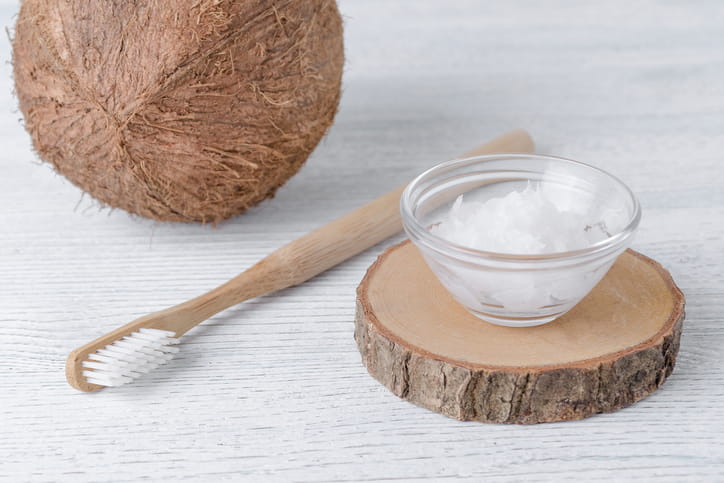Oral hygiene is crucial for your health. In addition to affecting your risk of periodontitis and cavities, germs and bacteria in your mouth can enter your body. When this happens, the germs and bacteria can cause or contribute to severe health issues, such as cardiovascular disease and pneumonia.
Some people turn to ancient alternative treatments to improve their oral health. Oil pulling is an oral health remedy people have used for centuries. Suppose you’re interested in using holistic practices to improve your oral health. In that case, you may wonder what oil pulling is and if oil pulling is safe. What does oil pulling do, and does oil pulling work? Let’s take a closer look at oil pulling and what dentists have to say about it.
What Is Oil Pulling?
Oil pulling advocates believe the practice is a legitimate way to improve oral health. It involves using common oils to rinse your mouth.
Why Do People Use Oil Pulling?
People may use oil pulling because they favor holistic health practices that they believe deliver health benefits or because they want to save money.
Oil Pulling Health Benefit Claims
People who practice oil pulling believe the practice reduces the amount of harmful bacteria in their mouths and offers other significant health benefits.
Oil pulling advocates claim the practice delivers the following benefits:
- Eliminate halitosis
- Eliminate toxins in the bloodstream
- Prevent cardiovascular disease
- Reduce inflammation
- Stop gums from bleeding
- Treat cavities
- Whiten teeth
People may also use oil pulling to address the following issues:
- Chapped lips
- Eliminating dry mouth
- Eliminating plaque
Financial Factors
Dental care costs may deter some people from seeking treatment. Those interested in maintaining their dental health without insurance and those who do not have the funds to cover their insurance plan’s deductible may try more affordable holistic remedies.
Since oil pulling can be practiced with just oil, water, and time, some may feel it’s worth it to try it as an affordable remedy or preventative measure. Depending on the type of oil you choose, the practice could stain your teeth, and some oils also have an unpleasant aftertaste, but some who practice oil pulling may assume the potential benefits outweigh the risks.
At Absolute Dental, we have special offers available to all patients to ensure people have access to affordable dental care. Seeing a board-certified dentist ensures you receive a thorough examination, accurate information about your oral health, and appropriate options to treat any dental issues.
A Dentist’s Concerns About Oil Pulling
There are those making bold health claims about the benefits of oil pulling, but you may still wonder if it works and why your dentist doesn’t suggest it when they recommend brushing and flossing your teeth.
Dentists recommend health practices subjected to scientific studies that establish benefits and risks. While some oil pulling studies have been conducted, the results are inconsistent, and without verified results from reputed sources, it’s inconclusive whether oil pulling offers any health benefits.
There are some potential risks you should know about before trying oil pulling. These risks include the following:
- Aspiration
- Lipoid pneumonia
- Stomachache
- Weakened tooth enamel
It’s also important to discuss oil pulling with your dentist if you have dental appliances in your mouth. You should understand the potential impact and risks if you have crowns, veneers, braces, or any other dental appliances.
How Is Oil Pulling Done?
Oil pulling involves taking the following steps:
- Select the oil: Choose between common oils, such as coconut, palm, sesame, and sunflower oil.
- Measure the oil: You need one teaspoon of your chosen oil.
- Swish: Put the oil in your mouth and swish it like you would mouthwash. Continue swishing for 20 minutes.
- Eliminate: Spit out the oil.
- Rinse: Use water to rinse your mouth thoroughly.
- Repeat: Those who use oil pulling to maintain the health of their teeth and gums should complete these steps three times every day.
What Types of Oils Are Used?
Those practicing oil pulling have several oils to choose from, including the following:
- Clove
- Coconut
- Lemon
- Olive
- Palm
- Sesame
- Sunflower
The taste and characteristics of the oil may affect which type you choose. You should also ensure the oil you use is chemical-free. The best type of oil for you to use is organic, unrefined, and cold-pressed.
The Bottom Line on Oil Pulling
The most effective way to care for your teeth and gums involves the following:
- Dental checkups every six months
- Brushing your teeth at least two times daily
- Consume an oral health-friendly diet
- Floss at least once daily
- Rinse with mouthwash up to two times per day
- Use a toothbrush with soft bristles
- Use toothpaste with fluoride
With no evidence to support the purported benefits of oil pulling, the best way to maintain oral health is to maintain a healthy oral hygiene routine incorporating steps with proven health results.


Regular Price:
$179
With this offer, there’s no excuse not to get back on track! Schedule a complete exam and x-rays for only $39 and ensure you have a beautiful healthy smile.
Sources:
Burch, K. (2024). Benefits of Oil Pulling.
King, A. (2018). Bad Science: Oil pulling.
Naseem, M., et al. (2017) Oil pulling and importance of traditional medicine in oral health maintenance.
Oral Health: A window to your overall health. (2024).
Walters, A. (2024). Oil pulling literature review.
